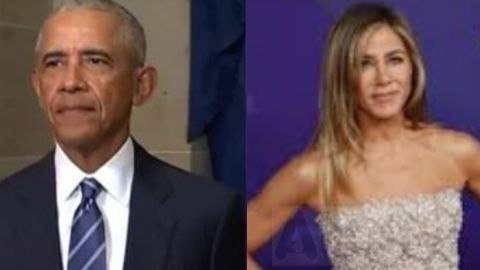Table of Contents
The dating rumors between Jennifer Aniston, a prominent actress, and Barack Obama, the former President of the United States, have generated significant buzz across various media platforms. Initially surfacing in late 2022, speculation about their relationship began to circulate following a series of public appearances where the two were seen interacting amicably. Social media platforms were soon ablaze with commentary, memes, and opinions, which only fueled the conversation surrounding their connection.
In recent months, these rumors have experienced a resurgence, particularly after both Aniston and Obama separately attended high-profile events, once again sparking interest in their potential romantic link. What stands out is how the collusion of celebrity culture and political dynamics shapes public perception, making personal relationships subject to intense scrutiny. This phenomenon highlights the complexities of modern media, where personal lives of public figures can dominate headlines and influence societal discourse.
These rumors have not only captivated fans of Aniston and political observers but also underscored the enduring importance of personal relationships within political spheres. Historically, alliances—whether personal or professional—between celebrities and politicians often yield significant cultural implications. As the public grapples with these rumors, one must consider how such relationships can affect reputations, public opinion, and even political landscapes. By intertwining the lives of a notable Hollywood figure and a respected political leader, this situation embodies the peculiar interplay between media sensationalism and the reality of personal associations, prompting further examination of the social dynamics at play.
The Source of Speculation
The recent dating rumors involving actress Jennifer Aniston and former President Barack Obama have captivated public attention and ignited discussions across social media platforms. The origin of these speculations can be traced back to a leaked direct message, reportedly exchanged on popular social media channels. This message, which purportedly contained a personal dialogue between Aniston and Obama, has raised eyebrows and sparked widespread curiosity regarding the nature of their relationship.
The role of individuals within Aniston’s immediate social circle cannot be overlooked. Insiders close to the actress might have inadvertently fueled these rumors through their interactions, highlighting the fragile boundaries between personal lives and public speculation. Such incidents often showcase how even innocuous messages can be misconstrued, leading to a cascade of interpretations that engulf both public figures in a whirlwind of conjecture.
Moreover, gossip circles play an essential part in the proliferation of these narratives. As news travels quickly from one individual to another, embellished details often seep into public discourse, thereby transforming benign information into sensational news items. The ambiguity surrounding the leaked message has only intensified the intrigue, encouraging further speculation. Prominent media outlets have seized the opportunity to cover this story, drawing on social media comments and creating a feedback loop that perpetuates and amplifies the speculations surrounding Aniston and Obama.
The dynamics of celebrity culture and the rapid speed of information dissemination in today’s digital age make it increasingly easy to misinterpret intentions. For anyone following the narrative, it is crucial to discern the difference between verified information and sensationalized gossip. With each passing day, the lingering questions surrounding the authenticity of this relationship scenario continue to stimulate dialogue among fans and critics alike, encompassing a blend of fascination and skepticism.
Megyn Kelly’s Commentary
During a recent televised discussion, Megyn Kelly provided her insights on the swirling rumors regarding a potential romantic relationship between President Obama and actress Jennifer Aniston. Kelly’s perspective focused on the broader implications of such a high-profile pairing, suggesting that it could lead to a significant shift in American political dynamics, specifically impacting the Democratic Party. She articulated the notion that celebrity associations carry weight in political circles and can influence public perception and support for political figures.
Kelly emphasized that if the rumors were to gain traction, they might create a ‘political earthquake,’ altering the landscape of the upcoming elections. The intersection of celebrity culture and politics is a subject of keen interest, especially in an era where social media amplifies every narrative. An Obama-Aniston affair, according to Kelly, could overshadow more pressing political issues and reframe public dialogue around personal lives rather than policies. She raised valid concerns regarding how a potential romantic relationship could detract from the vital discussions that really impact American society.
Furthermore, Kelly touched on the topic of presidential divorce, indicating that such a situation could invite scrutiny and diminish a leader’s credibility. She posited that the implications extend beyond mere gossip, suggesting that an affair or a divorce could fundamentally alter the political landscape. Citing examples from history, Kelly warned that implications surrounding personal lives can have lasting effects on political careers. The blending of entertainment and politics, as noted by Kelly, presents a formidable challenge to the credibility and integrity of political entities, particularly the Democratic Party. As the discourse surrounding Aniston and Obama evolves, so too does the potential for unforeseen consequences in the realm of American political engagement.
Historical Context of Political Scandals
Political scandals have long been a cornerstone of public discourse, often intertwining personal relationships with issues of governance and public image. From the early days of the United States, figures such as Thomas Jefferson faced scrutiny for their personal affairs, sparking debates that echoed through the annals of history. The exploration of personal relationships among political leaders frequently served as a litmus test for societal values at various times.
In more recent history, the affair between Bill Clinton and Monica Lewinsky redefined the landscape of political scandals. It not only led to impeachment proceedings but also raised questions about the nature of morality in public life. This case highlighted the intersection of private behavior with public responsibilities, illuminating how personal choices can lead to significant ramifications for leaders and their families. The fallout was not confined to the individuals involved; it resonated across American society, influencing perceptions of trust and integrity in political leadership.
The reliance on sensationalism in media coverage of such scandals often obscures the wider implications that scandals can have on families, including the children of politicians who may grapple with public ridicule. The psychological burden and societal judgment faced by families encountering the shame or gossip surrounding political scandals cannot be understated. It is within this historical context that the dating rumors involving Barack Obama and Jennifer Aniston can be framed. While seemingly a modern phenomenon, this particular gossip taps into a longstanding tradition of scrutinizing the personal lives of public figures, reminding society of the interplay between celebrity culture and political integrity.
As we navigate contemporary political landscapes, understanding the historical background of scandals prepares us to critically evaluate new allegations, such as those surrounding prominent figures like Obama and Aniston. The societal response to these rumors will likely reflect the evolving dynamics of public expectations concerning personal conduct among those in power.
Public Response and Social Media Reactions
The dating rumors involving Jennifer Aniston and Barack Obama have triggered a substantial reaction across various social media platforms, reflecting a unique intersection of celebrity culture and political discourse. From Twitter to Instagram, the public has not only expressed curiosity but also entertained themselves with humor, skepticism, and outright disbelief regarding the potential relationship between the former president and the well-known actress.
As the speculation gained momentum, hashtags such as #AnistonObama became trending topics, showcasing how quickly information—and misinformation—spreads on social media. Users have created a plethora of memes that humorously depict imagined scenarios of the rumored couple. Such online content often oscillates between playful banter and serious commentary, highlighting the dual nature of celebrity relationships in public perception.
Public opinion appears divided yet engaged. Some users have expressed genuine excitement about the prospect, viewing it as a groundbreaking pairing that could transcend the usual boundaries between politics and Hollywood. Others have voiced their concerns, questioning the validity of the rumors and the impact such a relationship could have on both their images. Political commentators have also jumped into the fray, analyzing the potential implications of this unlikely pairing on Obama’s legacy and Aniston’s public persona.
The engagement of both celebrity and political commentators has heightened the conversation, with various media outlets inviting expert opinions to dissect what these rumors imply. This public discourse emphasizes how intertwined celebrity and political narratives are today. Through Twitter threads and online articles, individuals are dissecting every angle of the rumored relationship, generating spirited debates about the nature of such interactions in a society that craves both authenticity and entertainment.
Ultimately, the buzz surrounding the Aniston-Obama dating rumors illustrates the significant role social media plays in shaping public sentiment and perception, particularly when it comes to figures who straddle the celebrity and political worlds.
The Role of Celebrity in Politics
The intersection of celebrity culture and politics has become increasingly pronounced in contemporary society. High-profile individuals, such as Jennifer Aniston and former President Barack Obama, are often at the epicenter of this intersection, where their personal lives and public personas intertwine, creating narratives that resonate with the general populace. The relationship between celebrities and political figures captures significant media attention and public fascination, reflecting deeper societal attitudes and cultural dynamics.
Celebrity relationships, particularly with political figures, evoke a sense of intrigue and speculation among the public. This phenomenon occurs partly due to the human tendency to be captivated by the lives of those who inhabit the limelight. The connections that emerge between the realms of entertainment and politics often highlight the complexities of fame, influence, and public perception. High-profile affairs resonate not only because of the individuals involved but also due to what these relationships symbolize about societal values and norms.
The synergy between celebrity culture and politics can also be observed in how these figures use their platforms to amplify certain messages or influence political discourse. Celebrities have the ability to engage with a vast audience, thereby steering public opinion and often shaping political narratives. As seen in various instances, when famous personalities enter the political arena or align themselves with specific causes, they bring an audience that might not otherwise engage in political matters. Consequently, relationships like those rumored between Aniston and Obama can spark conversations about politics in a more relatable context.
Moreover, the public’s engagement in celebrity relationships often serves as a lens through which to examine societal attitudes toward power, culture, and identity. The fascination with these intersections reveals much about contemporary values, showcasing how the narratives constructed around these figures can both reflect and influence cultural discourse. Understanding the role of celebrity in politics is essential for comprehending the broader implications of fame in shaping contemporary societal values.
Potential Outcomes and Implications
The speculation surrounding the rumored relationship between Jennifer Aniston and Barack Obama has sparked a flurry of discussions regarding its potential outcomes and implications. Both Aniston and Obama are prominent figures, influencing not only the entertainment landscape but also the political sphere. If the rumors were to hold any truth, their association could create significant changes in public perception and the overall political climate in the United States, particularly for the Democratic Party.
Firstly, a relationship between a beloved actress and a former president could enhance public interest in the Democratic Party. Celebrities often possess the power to sway public opinion, and Aniston’s widespread popularity may lead to increased engagement among younger voters, who typically demonstrate less interest in politics. This newfound interest could translate into greater voter turnout and support for Democratic candidates in upcoming elections, shaping future political strategies.
On the other hand, the implications could be more complex. If the rumored romance is met with skepticism or backlash, it might lead to a divide among party supporters. Critics could argue that an association with a high-profile celebrity takes focus away from the pressing issues at hand. Furthermore, the relationship could be scrutinized through a lens of celebrity culture, which may detract from Obama’s political legacy and influence the way he is perceived within the context of serious political discourse.
Beyond these personal implications, the broader societal impact cannot be disregarded. The coupling could serve as a representation of changing political norms, where the lines between celebrity and politics continue to blur. In a time when public figures are often judged for their personal lives, the Aniston-Obama narratives could become emblematic of the struggle between maintaining a respectable political image and the allure of celebrity culture.
Expert Insights and Analysis
The recent dating rumors surrounding Jennifer Aniston and Barack Obama have not only captivated celebrity enthusiasts but have also drawn the attention of political analysts and sociologists. This intersection of celebrity culture and political interest prompts a deeper examination of how such alleged relationships might affect individual reputations, public perception, and even societal dynamics.
Political analysts often note that the intertwining of celebrity and politics can reshape narratives. When a figure such as Obama, who holds considerable influence, is rumored to be linked romantically with a well-known actress like Aniston, it creates a ripple effect in public discourse. The reactions can range from intrigue and admiration to skepticism and apprehension. Such dynamics demonstrate how celebrity status can both enhance and complicate political image, offering pros and cons that must be tactically navigated by public figures.
Moreover, experts in celebrity culture emphasize that the allure of these rumors speaks volumes about society’s obsession with personal lives of public figures. This fascination not only reflects cultural values but also influences how individuals relate to celebrity personas. Psychologically, the potential romance may stir feelings of identification, aspiration, or even jealousy among fans, showcasing the power of celebrity influence in shaping emotional responses and societal norms.
In the context of these discussions, it is crucial to acknowledge the potential consequences of such rumors on both individuals involved. Aniston is often seen as a beacon of resilience and positivity, while Obama is revered for his leadership. The risk of damaging reputations or fostering harmful speculation is a serious concern that accompanies the enthusiastic event of celebrity coupling. Therefore, this interplay between personal lives and professional identities deserves meticulous scrutiny to comprehend its implications for both individuals and society at large.
Conclusion: The Future of the Rumors
The ongoing rumors surrounding a potential relationship between Jennifer Aniston and Barack Obama have captured significant attention, stirring a considerable amount of speculation and public discourse. This interest highlights not only the fascination with celebrity and political figures but also the complex intersection between the two realms. As such, one can anticipate that these discussions will persist as more information surfaces, or if either party addresses the situation explicitly.
The uncertainty enveloping these rumors can lead to various outcomes. On one hand, should the gossip continue without any substantial confirmation, it may dwindle over time, overshadowed by new developments in the lives of both Aniston and Obama. On the other hand, a formal statement from either individual could reignite interest and possibly even alter public perception. The potential for relationship developments, whether confirming or denying the existing rumors, will likely maintain audience engagement, particularly in the entertainment and political spheres.
Moreover, the impact of these dating rumors may ripple beyond personal lives into the broader public opinion. Relationships involving prominent figures can significantly influence their reputations and public personas, especially when addiction to such narratives becomes prevalent in media outlets. Therefore, both Aniston and Obama’s responses—or lack thereof—could be pivotal. The combination of their celebrity status and political legacy adds layers of complexity to the situation, making it a fertile ground for ongoing speculation.
Ultimately, while the future of the Aniston and Obama rumors remains ambiguous, the interplay between their public images and personal choices will undoubtedly shape how the narrative unfolds. Observers are likely to remain captivated, closely monitoring this politically charged storyline and its implications for the personalities involved.





